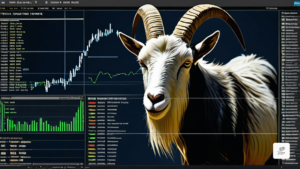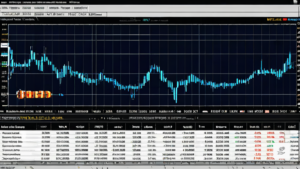Unveiling the Secrets of Arbitrage Trading: A Comprehensive Guide

Introduction to Arbitrage Trading: A Path to Profitability
Welcome to the captivating world of arbitrage trading, where astute investors navigate the financial markets with finesse, seeking to exploit price discrepancies for potential profits. In this comprehensive guide, we will delve into the intricacies of arbitrage trading, empowering you with the knowledge and strategies to embark on this rewarding journey.
Understanding the Essence of Arbitrage Trading
5 key points about UProfit

- Identify and exploit price discrepancies for potential profits.
- Types of arbitrage trades include pure, cross, and statistical.
- Essential skills for arbitrage trading include analytical acumen, speed of execution, and risk management.
- The benefits of arbitrage trading include consistent profits, reduced risk, and educational value.
- Arbitrage trading requires dedication, perseverance and a thirst for knowledge.
At its core, arbitrage trading involves identifying and capitalizing on price differences between identical or similar assets traded on different markets or exchanges. This strategy hinges on the principle of market inefficiencies, where prices do not always align perfectly, creating opportunities for savvy traders to profit.
Arbitrageurs, the masterminds behind this trading approach, meticulously analyze market data, seeking out these price discrepancies. They leverage their expertise and lightning-fast execution to capture these fleeting profit opportunities.
Types of Arbitrage Trading: A Spectrum of Strategies
The world of arbitrage trading encompasses a diverse array of strategies, each tailored to specific market conditions and asset classes. Let’s explore some of the most prevalent types:
Pure Arbitrage: The Quintessential Approach
Pure arbitrage, the cornerstone of arbitrage trading, involves simultaneously buying an asset on one market while selling an identical asset on another market at a higher price. This strategy capitalizes on price differences between exchanges or markets, offering the potential for quick and substantial profits.
Cross-Market Arbitrage: Expanding the Horizon
Cross-market arbitrage takes arbitrage trading to the next level by identifying price discrepancies between different markets for the same asset. This strategy requires a deep understanding of market dynamics and the ability to navigate multiple exchanges seamlessly.
Statistical Arbitrage: Embracing the Power of Data
Statistical arbitrage, a more sophisticated approach, employs statistical models and algorithms to identify patterns and inefficiencies in the market. This strategy leverages vast amounts of data to uncover hidden opportunities and enhance profitability.
Essential Skills for Arbitrage Trading: The Path to Mastery
5 key points about UProfit

- Identify and exploit price discrepancies for potential profits.
- Types of arbitrage trades include pure, cross, and statistical.
- Essential skills for arbitrage trading include analytical acumen, speed of execution, and risk management.
- The benefits of arbitrage trading include consistent profits, reduced risk, and educational value.
- Arbitrage trading requires dedication, perseverance and a thirst for knowledge.
To thrive in the competitive world of arbitrage trading, aspiring traders must cultivate a unique set of skills that will empower them to navigate the complexities of the financial markets. These essential skills include:
Analytical Acuity: A Keen Eye for Market Inefficiencies
Arbitrage traders possess a razor-sharp analytical mind, enabling them to swiftly identify price discrepancies and market inefficiencies. They meticulously study market data, recognizing patterns and anomalies that others may overlook.
Execution Speed: The Race Against Time
In the fast-paced world of arbitrage trading, speed is of the essence. Traders must be able to execute trades with lightning-fast precision to capture fleeting profit opportunities. This requires a combination of technological prowess and a deep understanding of market dynamics.
Risk Management: Navigating the Unpredictable
Arbitrage trading, like any financial endeavor, carries inherent risks. Effective risk management is paramount to preserving capital and ensuring long-term success. Traders must implement robust risk management strategies to mitigate potential losses and protect their hard-earned profits.
The Allure of Arbitrage Trading: Unveiling the Benefits
The allure of arbitrage trading lies in its potential for consistent and substantial profits. By exploiting market inefficiencies, arbitrageurs can generate returns that may not be readily available through traditional investment strategies. Additionally, arbitrage trading offers the following benefits:
Reduced Risk: Diversifying the Portfolio
Arbitrage trading can serve as a valuable portfolio diversifier, reducing overall risk. By incorporating arbitrage strategies into their investment portfolios, traders can potentially mitigate losses during market downturns and enhance their risk-adjusted returns.
Passive Income: A Steady Stream of Profits
For those seeking a passive income stream, arbitrage trading presents an attractive opportunity. By employing automated trading systems or partnering with experienced traders, investors can potentially generate consistent profits without the need for active trading.
Educational Value: Enhancing Market Understanding
Arbitrage trading offers a unique educational experience, deepening traders’ understanding of market dynamics and financial instruments. By analyzing market data and identifying price discrepancies, traders gain valuable insights into the inner workings of the financial markets.
Conclusion: Embarking on the Arbitrage Trading Journey
5 key points about UProfit

- Identify and exploit price discrepancies for potential profits.
- Types of arbitrage trades include pure, cross, and statistical.
- Essential skills for arbitrage trading include analytical acumen, speed of execution, and risk management.
- The benefits of arbitrage trading include consistent profits, reduced risk, and educational value.
- Arbitrage trading requires dedication, perseverance and a thirst for knowledge.
Arbitrage trading, with its potential for profitability, diversification, and educational value, presents a compelling opportunity for investors seeking to navigate the financial markets. By embracing the essential skills, understanding the different types of arbitrage strategies, and implementing sound risk management practices, aspiring arbitrageurs can embark on a rewarding journey towards financial success.
Remember, the world of arbitrage trading is constantly evolving, requiring traders to stay abreast of market trends and technological advancements. With dedication, perseverance, and a thirst for knowledge, you can unlock the secrets of arbitrage trading and achieve your financial aspirations.




